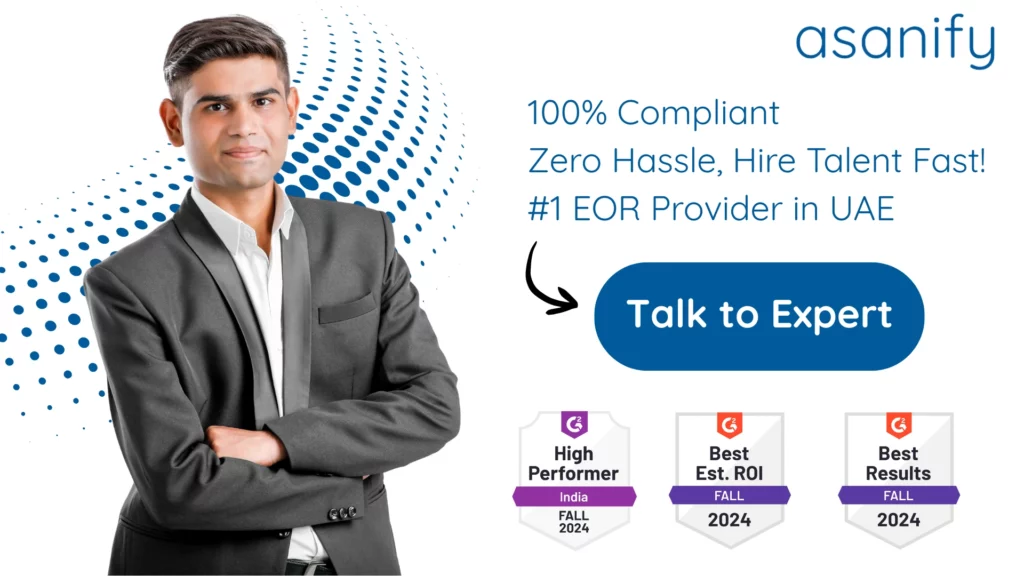The United Arab Emirates in 2025 continues to be one of the world’s most attractive destinations for global businesses. With its strong economy, low taxation policies, and position as a trade hub connecting the Middle East, Africa, and Asia, the UAE is ideal for companies in finance, logistics, technology, and tourism. Dubai, Abu Dhabi, and Sharjah remain leading business hubs with advanced infrastructure and international connectivity.
Foreign companies planning to register a business in the UAE benefit from flexible company structures, 100% foreign ownership in most free zones, and simplified business regulations. This guide explains market entry options, entity types, registration steps, key documents, costs, compliance requirements, and Employer of Record (EOR) solutions to help your expansion into the UAE.
Table of Contents
- Exploring Your Market Entry Options in UAE
- Business Structures You Can Choose From
- Comparing Business Structure Options
- How to Choose the Right Business Model for Your Operations
- Step-by-Step Guide to Company Registration in UAE
- Key Documents Required to Register Your UAE Company
- Post-Incorporation Essentials You Shouldn’t Ignore in UAE
- Additional Business Licenses and Registrations You Might Need in UAE
- Timeframe to Set Up a Business in UAE
- What Does It Cost to Incorporate a Company in UAE?
- Obstacles Global Founders May Face While Setting Up in UAE
- Incorporating as a Foreign-Owned Company: A Special Path
- Employer of Record: A Simpler Way to Hire in UAE Without Incorporation
- Why Asanify is the Ideal Partner for Global Companies Entering UAE
- Summary & Final Takeaways
- FAQs
Exploring Your Market Entry Options in UAE
Global businesses typically choose between two primary entry strategies:
Incorporating a Local Business Entity
Companies can set up in either the mainland or one of the UAE’s free zones.
- Mainland companies can trade within the UAE and require registration with the Department of Economic Development (DED).
- Free zone companies are easier to set up, offer 100% foreign ownership, and are ideal for international trading, services, and e-commerce.
This option is best for long-term operations, full operational control, and businesses planning to sign contracts locally.
Hiring Through an Employer of Record (EOR)
If your company is exploring the market or building a small team without setting up a legal entity, an Employer of Record is a fast and compliant solution. The EOR hires UAE-based employees on your behalf, managing contracts, payroll, visas, and social contributions, while you control daily operations. This approach is ideal for market testing or rapid entry.
Business Structures You Can Choose From
The UAE offers multiple entity types for foreign investors:
- Limited Liability Company (LLC) – Most common structure for mainland businesses; can have 100% foreign ownership in most sectors.
- Free Zone Company – Offers 100% foreign ownership, tax incentives, and simplified compliance; restricted to free zone and international operations.
- Branch Office – Extension of a foreign company; allows full foreign ownership and revenue-generating operations.
- Representative Office – For market research and liaison; cannot engage in commercial activities.
- Sole Proprietorship – Usually for professional services and may require a local service agent.
Comparing Business Structure Options
| Structure | Ownership | Liability | Taxation | Best For |
| LLC | 100% foreign in most sectors | Limited | Corporate tax (9% over threshold) | Local operations and trade |
| Free Zone Company | 100% foreign | Limited | 0–9% corporate tax | International trade, e-commerce, and services |
| Branch Office | Foreign parent | Parent liable | Corporate tax (if applicable) | Foreign companies with revenue operations |
| Representative Office | Foreign parent | Parent liable | None | Market research and liaison |
| Sole Proprietorship | Local or foreign | Unlimited | Personal tax | Professional services and consultancy |

How to Choose the Right Business Model for Your Operations
Choosing the right structure depends on your goals and operations:
- LLCs are ideal for companies seeking local market access and long-term business operations.
- Free zone companies are best for 100% foreign ownership, tax advantages, and international trade.
- Branch offices suit established foreign companies expanding into the UAE.
- Representative offices are best for non-commercial activities and research.
- EOR is ideal for testing the market and building small teams quickly without incorporation.
Suggested Read: Labour Laws in UAE (2025): A Complete Guide
Step-by-Step Guide to Company Registration in UAE
- Choose the appropriate legal structure and location (mainland or free zone).
- Reserve a unique trade name with the Department of Economic Development (DED) or free zone authority.
- Obtain initial approval for the business activity and foreign ownership status.
- Prepare and notarize the Memorandum of Association (MoA) and Articles of Association (AoA).
- Lease an office space or secure a free zone business address.
- Submit all documents to the DED or free zone authority for final approval and licensing.
- Open a corporate bank account in the UAE for capital deposits and operations.
- Register for VAT if annual turnover exceeds the mandatory threshold.
- Obtain employee visas and labor registrations for staff.
- Apply for any sector-specific permits if required.
Key Documents Required to Register Your UAE Company
- Passports of all shareholders and directors
- Proof of residential address for shareholders and directors
- Trade name reservation certificate
- Initial approval from DED or relevant free zone authority
- Memorandum and Articles of Association
- Lease agreement for the registered office or free zone space
- Bank reference letter or certificate of capital deposit (if applicable)
- Power of Attorney for local representatives (if required)
Post-Incorporation Essentials You Shouldn’t Ignore in UAE
- Open a fully operational corporate bank account
- Obtain business licenses and renew them annually
- Maintain proper accounting records and submit annual audits (for certain free zones)
- Register for VAT if applicable and file quarterly returns
- Ensure compliance with labor laws and WPS (Wage Protection System)
- Keep trade and commercial licenses valid to avoid penalties

Additional Business Licenses and Registrations You Might Need in UAE
Some industries require sector-specific approvals, including:
- Financial services licenses from the Central Bank of the UAE
- Tourism and hotel licenses from the Department of Tourism and Commerce Marketing (DTCM)
- Healthcare licenses from the Ministry of Health or DHA
- E-commerce licenses for online retail operations
- Industrial permits for manufacturing and production activities
Timeframe to Set Up a Business in UAE
| Step | Estimated Duration |
| Trade name reservation | 2–3 business days |
| Initial approval and documentation | 3–5 business days |
| Final licensing and incorporation | 5–10 business days |
| Bank account opening and post-setup | 7–14 business days |
| Total Time to Register | 15–30 business days |
What Does It Cost to Incorporate a Company in UAE?
- Trade name reservation and initial approval: $200–$500
- Licensing and registration fees: $2,500–$7,000
- Office lease or free zone virtual office: $1,500–$5,000 annually
- Legal, translation, and notarization services: $500–$2,000
- Optional VAT registration and sector-specific permits may add extra costs
Overall, incorporation costs typically range from $4,500 to $12,000, excluding office rentals and employee visa fees.
Obstacles Global Founders May Face While Setting Up in UAE
- Navigating differences between mainland and free zone regulations
- Requirement for notarization and Arabic translations of foreign documents
- Banking procedures that may require in-person verification
- Annual license renewals and ongoing compliance obligations
- Industry-specific permits and approvals for regulated activities
Incorporating as a Foreign-Owned Company: A Special Path
The UAE allows 100% foreign ownership in most free zones and many mainland sectors. Options include:
- Free Zone Company for international operations and tax benefits
- LLC with 100% foreign ownership in approved sectors
- Branch Office for established foreign companies
- Representative Office for market research and liaison
Some sectors like media, defense, or energy may require additional local approvals or partnerships.

Employer of Record: A Simpler Way to Hire in UAE Without Incorporation
Entering the UAE market does not always require creating a local legal entity. For many global companies, especially those exploring market potential or running pilot projects, an Employer of Record (EOR) offers a fast and fully compliant way to hire employees in the UAE without the cost, time, and complexity of full incorporation.
From a legal perspective, the EOR serves as the official employer for your UAE workforce. It manages employment contracts, payroll, tax compliance, and visa processing while adhering to the UAE’s labor regulations and the Wage Protection System (WPS). Meanwhile, your company retains full control over employees’ day-to-day work, tasks, and performance management.
This model is ideal for:
- Testing the UAE market before committing to a permanent entity
- Running short-term or project-based teams in sales, operations, or support
- Hiring remote UAE employees for regional or international roles
- Quickly expanding into the Middle East without navigating incorporation processes
Using an EOR shields foreign companies from many administrative and compliance challenges, including:
- Drafting UAE-compliant employment contracts
- Managing payroll and WPS submissions for salary protection
- Handling visa sponsorships, work permits, and renewals
- Ensuring statutory benefits like gratuity and paid leave are managed correctly
By leveraging an EOR, businesses reduce the risk of non-compliance, worker misclassification, and labor disputes, while achieving quick and cost-effective market entry in the UAE.
Suggested Read: Remote Employees Onboarding Checklist with EOR in UAE
Why Asanify is the Ideal Partner for Global Companies Entering UAE
Asanify provides full support to international businesses entering the UAE, offering both company incorporation services and Employer of Record services. For companies seeking long-term operations, we handle the entire process:
- Selecting the right entity type (Mainland LLC, Free Zone Company, or Branch Office)
- Registering with the Department of Economic Development (DED) or relevant free zone authorities
- Managing corporate bank account setup and trade license approvals
- Handling post-incorporation requirements, payroll, and tax compliance
- Ensuring adherence to labor laws and WPS for all employees
If you are not ready to establish a legal entity, our EOR solution allows you to hire UAE employees within just a few days. Asanify takes care of employment contracts, payroll processing, visas, and compliance obligations, so your team operates fully within UAE labor laws without administrative burdens.
We have successfully assisted clients across the US, Europe, Asia, and the Middle East in building UAE teams quickly and risk-free. Whether you are a startup testing demand or a multinational deploying a regional team, Asanify makes your UAE expansion smooth, compliant, and efficient.
Summary & Final Takeaways
The UAE in 2025 remains a strategic hub for global businesses, offering tax benefits, international connectivity, and access to the Middle East market. Companies have two main options for market entry: incorporate a local entity or hire through an Employer of Record (EOR).
If your goal is to establish a long-term presence, secure local contracts, or maintain full operational control, forming a registered UAE company is the best choice. However, if you want rapid market entry, short-term projects, or a small local team without the complexity of incorporation, an EOR allows you to start operations quickly while remaining fully compliant with UAE labor regulations.
FAQs
It usually takes 15–30 business days, depending on whether you choose a mainland or free zone setup.
Yes, in most free zones and many mainland sectors, 100% foreign ownership is now permitted.
Not always. Free zone companies and many mainland sectors allow full foreign ownership without a local partner.
Free zones often require minimal or no upfront capital, while LLCs may require AED 50,000 or more depending on the emirate and activity.
Yes, by using an Employer of Record (EOR) to handle employment contracts, payroll, and visa compliance.
UAE applies a 9% corporate tax above the AED 375,000 threshold, and VAT at 5% for applicable businesses.
Yes, sectors like finance, healthcare, e-commerce, and manufacturing require additional licenses or permits.
Most banks require at least one in-person visit for verification and KYC compliance.
Navigating local regulations, Arabic translations, annual license renewals, and bank compliance are the main challenges.
Using an Employer of Record (EOR) allows immediate and fully compliant hiring without incorporation.
Not to be considered as tax, legal, financial or HR advice. Regulations change over time so please consult a lawyer, accountant or Labour Law expert for specific guidance.

